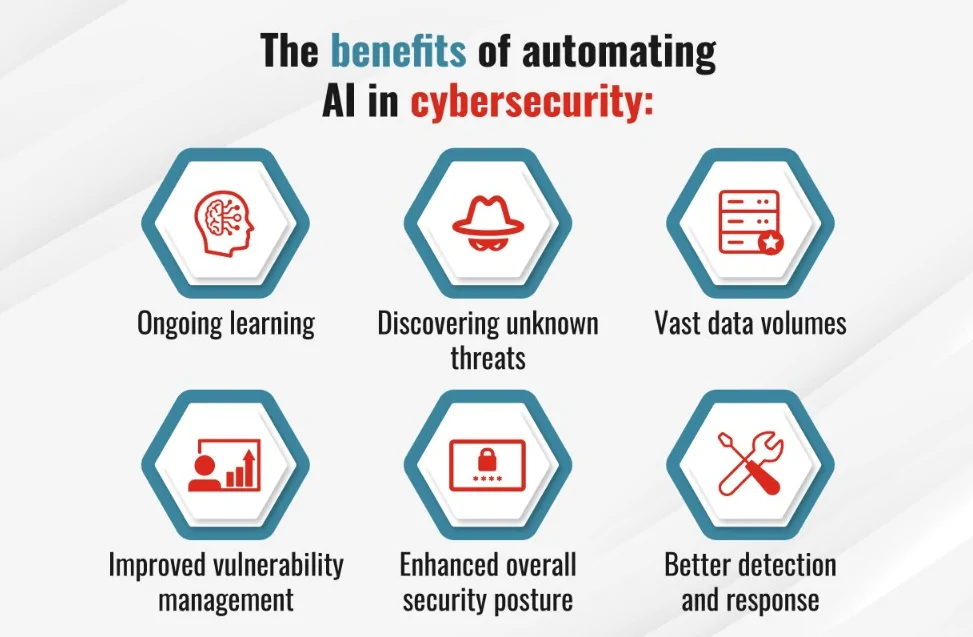
How to Use AI to Improve Security
Technology and innovation are changing our lives in unprecedented ways. One key area where AI is making a big difference is security. From facial recognition at airports to predictive cybersecurity analytics and public space surveillance, AI helps spot threats, find weak spots, and respond to incidents swiftly and accurately.
Here are some ways AI enhances security in our fast-paced world.
Corporate Security
Companies are using AI in cool new ways to improve security. AI can find potential threats faster than humans. For example, AI software can scan real-time data to spot unusual activity, like strange logins or hacking attempts. It can also adapt to upcoming attacks by learning from past incidents. This process is called machine learning, meaning the system gets smarter the more it works.
AI also helps businesses with physical security by using smart cameras and sensors to watch buildings. These systems can recognize faces or detect weapons. They alert security staff, speed up response times, and reduce risks for everyone.
Financial Institutions
Banks and financial companies manage much money and sensitive data, so they need strong security systems. AI monitors transactions for anything unusual. For example, if a bank customer suddenly makes an enormous purchase abroad right after making small purchases at home, the AI system might think that’s suspicious. It will block the transaction and notify the customer.
AI also helps financial institutions defend themselves against cyber threats. Hackers constantly try to break into bank systems, and AI helps detect strange patterns like too many login attempts or unauthorized access to certain accounts.
Public Safety
AI-powered cameras and sensors have never been safer! This technology enhances current surveillance systems, detecting unusual behaviour, and identifying potential threats. For example, these systems can spot abandoned bags at a crowded airport. They can also recognize license plates of wanted vehicles, or notice if someone acts suspiciously.
A weapon detection system can also find guns, knives, or other harmful items by analyzing camera footage or using specialized sensors. When a weapon is spotted, these systems can immediately alert authorities, allowing them to respond quickly and potentially prevent violence before it escalates.
Healthcare Systems
Hospitals and clinics handle sensitive patient information. Keeping that data safe is critical. As a result of AI, cyberattacks are prevented, and threats are detected early. For example, AI systems can notice unusual patterns in data access.
If someone downloads many records or accesses files they shouldn’t, this activity is flagged, and access is automatically blocked to keep patient information safe. AI also improves identity verification. Healthcare systems now use AI for biometric security, like fingerprint recognition, to ensure that only authorized personnel can access patient records or medical equipment.
Home Security
AI transforms home security with smart cameras and systems. These cameras use AI to recognize familiar faces and differentiate between people, pets, and objects. If your camera spots someone it doesn’t know hanging around your property, it can send an instant alert to your phone so you can act quickly. Another feature is integration with smart home devices.
AI can link various security gadgets, such as doorbell cameras, locks, and alarms, to form a complete security network. For example, if your doorbell camera senses someone at your front door, it can automatically lock the back door and switch on outside lights to make your home safer.
Energy Sector
In the energy sector, AI is used to monitor and manage energy grids. It can analyze large amounts of data to forecast energy needs and spot problems. For example, if energy use suddenly rises, AI can find possible issues like equipment breakdowns. This helps operators act quickly and stop outages.
As more digital systems are used, energy firms are at higher risk from cyber attacks. AI can help by constantly monitoring strange activities like unauthorized access or malware. Once it spots a possible breach, it alerts security teams and takes steps to control the threat, protecting critical infrastructure.
In a time when threats seem never-ending, AI is revolutionizing security. From enhancing surveillance to predicting potential threats, it’s exciting to see how this technology is no longer just a futuristic idea. Instead, it’s a vital part of our everyday safety.



